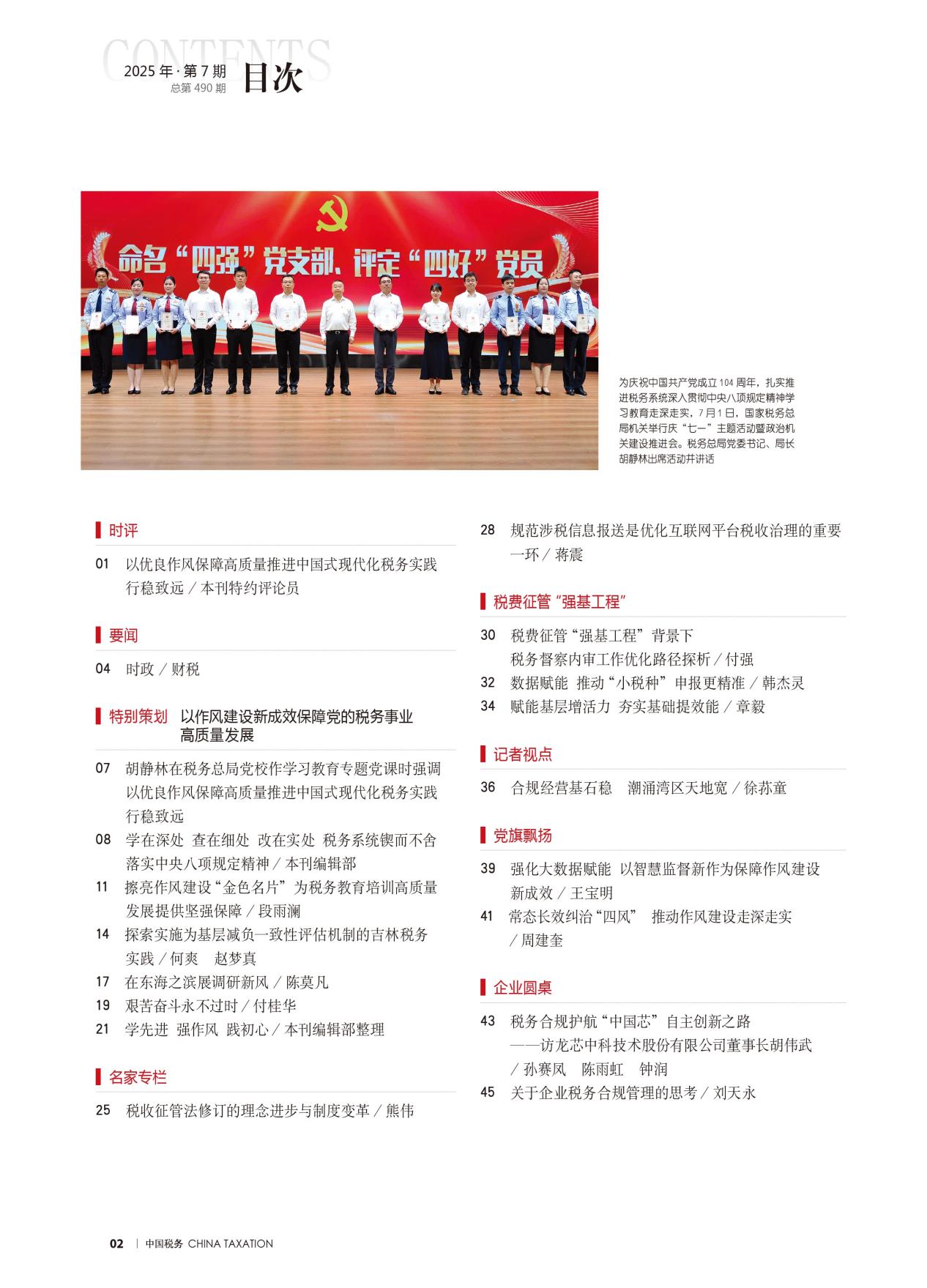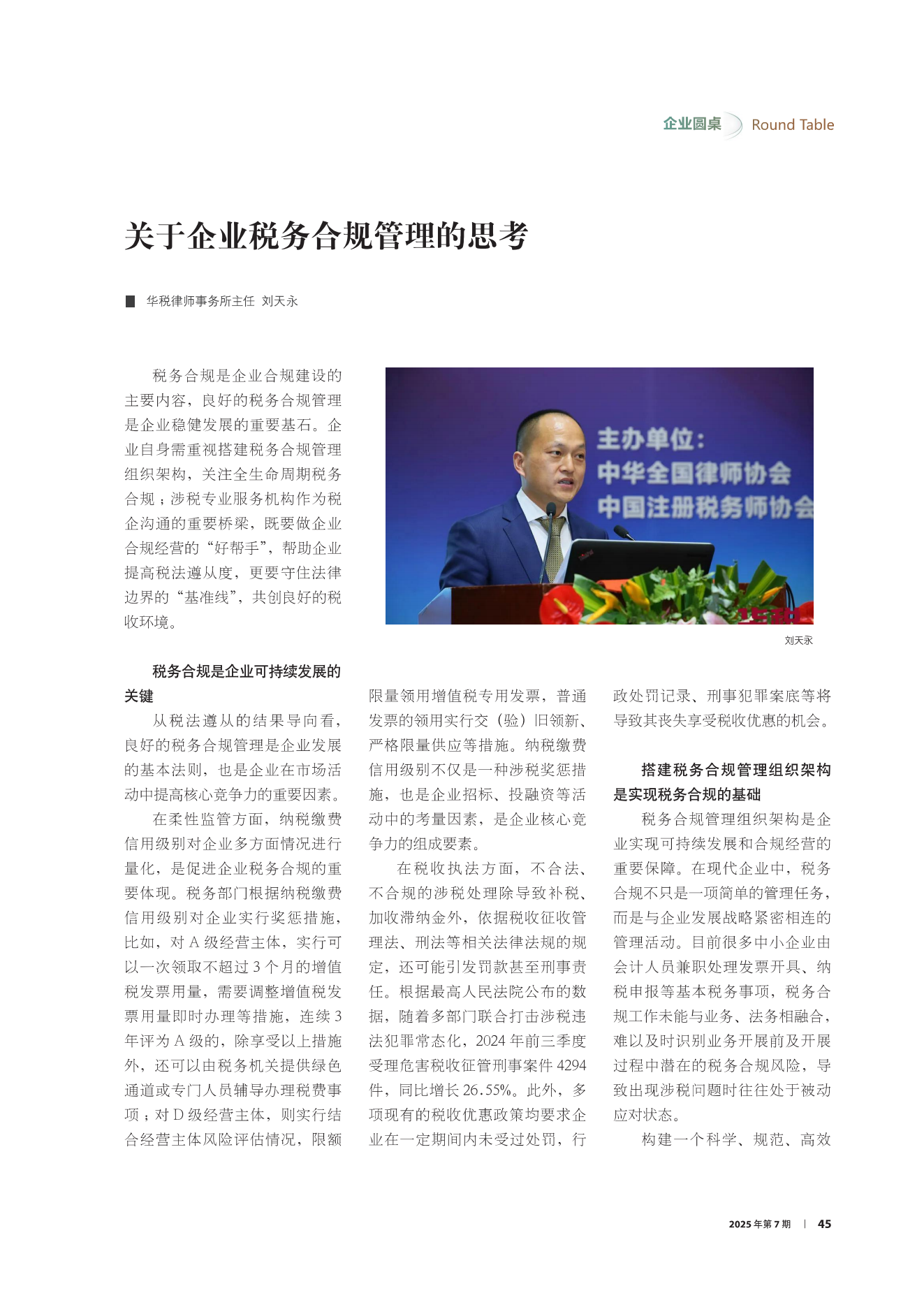Liu Tianyong: Thoughts on Corporate Tax Compliance Management (ZHONGGUO SHUIWU No.7)
Enterprises are the most important subject of market economy, and the compliance construction of enterprises plays an important role in preventing their own business risks and creating a good market environment. As the main content of enterprise compliance construction, good tax compliance management is of great significance to the steady development of enterprises. Recently, the article "Reflections on Corporate Tax Compliance Management" written by lawyer Liu Tianyong, director of Hwuason Law Firm, was published in the 7th issue of ZHONGGUO SHUIWU in 2025. Starting from the necessity of enterprise tax compliance management, this paper analyzes the key points of the whole process management of tax compliance from the perspective of enterprise life cycle, covering the important stages of enterprise establishment, operation, investment and financing, withdrawal and so on. At the same time, based on the recent disclosure of many cases of tax-related intermediary violations, it is suggested that tax-related professional service institutions should follow the principles of independence, objectivity, impartiality and standardization, and actively guide enterprises to operate in compliance. The full text is as follows:





Thoughts on tax compliance management of enterprises
Liu Tianyong, Director of Hwuason Law Firm
Tax compliance is the main content of enterprise compliance construction, and good tax compliance management is an important cornerstone for the steady development of enterprises. Enterprises themselves need to pay attention to building the organizational structure of tax compliance management and pay attention to tax compliance in the whole life cycle; As an important bridge of communication between tax enterprises, tax-related professional service organizations should not only be "good helpers" for enterprises to operate in compliance with the tax laws, but also keep the "baseline" of legal boundaries and create a good tax environment.
Tax compliance is the key to the sustainable development of enterprises
From the perspective of the result orientation of tax law compliance, good tax compliance management is the basic law of enterprise development and an important factor for enterprises to improve their core competitiveness in market activities.
In the aspect of flexible supervision, the credit rating of tax payment quantifies many aspects of enterprises, which is an important embodiment of promoting tax compliance of enterprises. The tax authorities implement reward and punishment measures for enterprises according to the credit rating of tax payment. For example, for A-level business entities, measures such as receiving the amount of VAT invoices for no more than three months at a time and adjusting the amount of VAT invoices immediately are implemented. If they are rated as A-level for three consecutive years, in addition to enjoying the above measures, the tax authorities can also provide green channels or specialized personnel to guide and handle tax matters; For the D-level business entities, measures such as combining the risk assessment of the business entities, collecting special VAT invoices in a limited amount, collecting ordinary invoices, introducing the old and introducing the new, and strictly limiting the supply are implemented. The credit rating of tax payment is not only a tax-related reward and punishment measure, but also a consideration factor in the activities of enterprise bidding, investment and financing, and an element of enterprise core competitiveness.
In terms of tax enforcement, illegal and irregular tax-related treatment may not only lead to overdue taxes and late payment fees, but also lead to fines and even criminal liability according to the provisions of tax collection and management law, criminal law and other relevant laws and regulations. According to the data released by the Supreme People's Court, with the normalization of multi-department joint crackdown on tax-related crimes, 4,294 criminal cases endangering tax collection and management were accepted in the first three quarters of 2024, with a year-on-year increase of 26.55%. In addition, many existing preferential tax policies require that enterprises have not been punished within a certain period of time, and the record of administrative punishment and criminal record will lead to their loss of opportunities to enjoy preferential tax.
Building the organizational structure of tax compliance management is the basis of tax compliance
The organizational structure of tax compliance management is an important guarantee for enterprises to achieve sustainable development and compliance management. In modern enterprises, tax compliance is not only a simple management task, but also a management activity closely related to the development strategy of enterprises. At present, many small and medium-sized enterprises have accountants working part-time to handle basic tax matters such as invoice issuance and tax declaration. The tax compliance work has not been integrated with business and legal affairs, so it is difficult to identify potential tax compliance risks before and during the business development, which often leads to passive response when tax-related problems arise.
Constructing a scientific, standardized and efficient tax compliance management organizational structure can not only help enterprises avoid risks and ensure compliance, but also enhance their overall operational efficiency and competitiveness. For example, a large enterprise group has established a three-tier tax management organizational structure of "tax management department of the group", "tax sharing center" and "tax management departments of member enterprises". The tax management department of the group sets its functions based on the overall perspective of the group, empowers the regional tax sharing center and tax management departments of member enterprises professionally, and organizes regular or irregular tax-related compliance spot checks to find problems and eliminate risks in time. The tax sharing center carries out standardized processing, data management, service support, system maintenance, etc., and plays a synergistic role to provide unified and efficient tax management services for all units in the group; The tax administration departments of member enterprises focus on the tax-related affairs of their enterprises. Through the above-mentioned three-tier tax management structure, the Group has established a tax compliance management system with clear objectives, clear responsibilities and efficient operation, thus escorting the high-quality development of the enterprise. We suggest that enterprises, based on the needs of tax compliance practice, vigorously build a tax compliance management organizational structure with deep integration of "industry, finance, law and tax", and put tax-related risk prevention ahead by clarifying the organizational responsibilities, functional division and operational procedures of tax compliance, so as to achieve a balance between economic interests and tax compliance.
Key points of the whole process management of tax compliance
Tax compliance runs through the whole life cycle of an enterprise, and there are tax compliance matters that need to be focused on at each stage.
The establishment stage. At this stage, the choice of place of registration, organizational form, shareholder's contribution, etc. all need to consider tax compliance factors. Take the choice of place of registration as an example. The place of registration of an enterprise is usually the main tax paying place where it declares and pays taxes such as enterprise income tax and value-added tax. In addition to the advantages of local industrial clusters and other resources, whether there is policy support is also an important consideration for enterprises to choose the place of registration. When enterprises apply supporting policies, on the one hand, they should pay attention to the legitimacy and stability of policies, on the other hand, they should also pay attention to whether they meet the conditions for policy application. In recent years, China has issued some regional preferential tax policies, such as giving 15% preferential tax rate to qualified enterprises established in Hainan Free Trade Port, Hengqin Guangdong-Macao Deep Cooperation Zone, Nansha First Start Zone and other areas. Such regional preferential tax policies all require the substantive operation of enterprises. Before landing, enterprises should fully understand the applicable conditions of the policies and make preparations for the allocation of personnel and assets in advance. In addition to the above-mentioned policies, some regions have introduced policies such as financial awards and subsidies to promote the development of local economy or industry. With the promotion of the construction of a unified national market and the implementation of the Regulations on Fair Competition Review issued by the State Council, illegal tax rebates have been cleaned up in recent years. Enterprises should fully investigate the legitimacy of preferential policies, analyze and evaluate the feasibility and redemption risks of policies when choosing investment sites.
Operation stage. In the operation stage of an enterprise, tax compliance runs through every business, from the drafting of terms when concluding a contract to the legality of issuing invoices in the process of business development, to the standardization of tax treatment such as income and cost confirmation and tax declaration, which all need full attention. In addition, enterprises also need to pay attention to the tax treatment of special matters. For example, in related party transactions, enterprises should form a reasonable plan for the process and pricing policy of related party transactions, fully consider the essence of the transaction, the risk bearing of all parties, the cost sharing, etc. At the same time, they should pay attention to the actual tax burden level of related parties, improve the rationality of related party pricing, and prevent the risk of adjusting and paying back taxes because they do not have reasonable commercial purposes or do not conform to the principle of fair trade. In addition, under the background of enjoying preferential tax policies, more and more enterprises can ease the financial pressure and reduce operating costs by enjoying policy dividends. While enjoying preferential policies, enterprises should pay full attention to the compliance risks of policy application. With the further deepening of the reform of tax collection and management, many preferential policies simplify the procedures and procedures, and adopt the application mode of "self-determination, self-declaration and post-event supervision", which also puts forward higher requirements for corporate tax compliance management and tests the initiative of corporate tax compliance. Enterprises should correctly understand the preferential tax policies, pay attention to the applicable conditions of the policies, and dynamically judge whether they meet the requirements. For those who do not meet the conditions, they should adjust the tax treatment in time. Take a case as an example. Recently, a listed company announced that the main business income in 2019 did not reach 70% of the total income of the enterprise, which did not meet the preferential tax conditions for the development of the western region, resulting in the payment of corporate income tax of 6.4 million yuan in that year and the payment of late fees.
Investment and financing links. In addition to daily business matters, enterprises should also pay full attention to tax compliance matters in investment and financing matters such as fund borrowing, restructuring and equity transfer. Enterprises' investment and financing matters often involve large targets, complex structure and various related tax policies. If the relevant policies are not accurately understood and applied, enterprises may miss the opportunity to enjoy preferential policies, and may also be at risk of paying taxes and charging late fees due to incorrect application of policies. For example, in financing activities, enterprises should pay attention to whether the lender of funds belongs to the category of financial institutions and accurately define the category of pre-tax deduction of interest. For borrowing funds through the group fund pool, they should pay attention to whether it belongs to the category of exemption from value-added tax; In debt restructuring, equity acquisition, asset acquisition or merger and separation, we should pay attention to whether it meets the applicable conditions of special tax treatment and make accurate tax treatment; In the stage of investment withdrawal, we should pay attention to whether the transaction has a reasonable commercial purpose and whether the pricing is fair. If we withdraw from the investment in a special way such as non-transaction transfer, dismantling the shareholding platform and reverting to direct shareholding by natural persons is a change of stock ownership among different entities, which will be regarded as sales in tax law. Enterprises should pay attention to the tax declaration obligations of natural person shareholders and limited company shareholding platforms.
Exit phase. Although the cancellation of an enterprise is to withdraw from the market, the tax compliance matters cannot be ignored. In recent years, there have been many cases in which cancelled enterprises have been asked to pay taxes and even shareholders have been held jointly and severally liable. According to the Guidelines for the Cancellation of Enterprises (revised in 2023) issued by the General Administration of Market Supervision, the General Administration of Customs and the State Administration of Taxation, enterprises usually need to go through three main processes: resolution dissolution, liquidation distribution and cancellation of registration. Under normal circumstances, taxpayers should submit relevant supporting documents and materials to the tax authorities, pay off taxes, cancel invoices and registration certificates, and go through tax cancellation registration after approval by the tax authorities. As for how to recover the tax arrears of cancelled enterprises, in recent years, many tax authorities have signed a memorandum of cooperation with the market supervision department to clarify the path of recovering the tax arrears of cancelled enterprises: for the tax-related illegal enterprises that have been cancelled, it is stipulated that the tax authorities should initiate and inform the market supervision department of the relevant investigation, and the market supervision department will cancel the registration of the enterprises involved in the case according to law and restore their qualifications as commercial subjects, and then the tax authorities will recover the tax arrears. Therefore, if an enterprise intends to withdraw from the market, before applying for cancellation, it should sort out all tax-related matters, pay taxes and fill in relevant application materials truthfully.
Tax-related professional service institutions should guide enterprises to operate in compliance
In 2025, the tax authorities concentrated on exposing a number of cases of tax-related intermediaries violating laws and regulations and cases in which tax officials colluded with tax-related intermediaries inside and outside to defraud taxes, further conveying a clear signal that the tax authorities have zero tolerance for tax-related intermediaries and related employees' violations of laws and regulations, and that taxes should be treated according to law and strictly. For example, the tax department of Hangzhou City, Zhejiang Province dealt with a tax-related intermediary agency in accordance with the law by using preferential tax policies to carry out illegal planning and help its agents evade taxes. Hangzhou Zerong Financial Consulting Co., Ltd. used the preferential tax policies to manipulate shell enterprises that forged the identity of taxpayers in the life service industry, maliciously obtained the bonus of adding and deducting the policy, and helped its agents evade taxes totaling 6,384,800 yuan. The tax authorities confiscated 770,000 yuan of illegal income of Hangzhou Zerong Financial Consulting Co., Ltd. according to law, and imposed a fine of 3,192,400 yuan, which was 0.5 times of the taxpayer's tax underpayment, and took measures such as including it in the tax-related service dishonesty list. Another example is that the tax department of Zhengzhou City, Henan Province, together with the public security organs, dealt with a tax-related intermediary agency and its legal representative falsely issuing VAT invoices according to law. Qin Moufei, the legal representative of Zhengzhou Dijin Enterprise Management Consulting Co., Ltd., falsely issued 97 VAT invoices through fictitious business, false settlement and capital return for the purpose of collecting "billing fee", with a total price tax of 1.9705 million yuan. Qin Moufei, the legal representative of the company, was sentenced to one year's imprisonment by the court for committing the crime of falsely issuing invoices. The tax authorities shall take measures such as including the company and its legal representative in the tax-related service dishonesty list.
Tax-related professional service institutions are the bridge between tax authorities and taxpayers and the backbone of socialized tax service. As a third-party organization, tax-related professional service institutions provide tax-related professional services such as tax declaration agency, tax consultation and tax planning for enterprises, which is also an important part of promoting tax compliance management of enterprises. They should strictly abide by the provisions of the Administrative Measures for Tax-related Professional Services (Trial), the Basic Guidelines for Tax-related Professional Services (Trial) and the Code of Professional Ethics for Tax-related Professional Services (Trial), and should not follow the principles of independence, objectivity, impartiality and standardization. At the same time, tax-related professional service institutions should also actively guide enterprises to operate in compliance, give full play to the positive role of "from point to surface" on the basis of providing professional service accuracy, and make professional value fully displayed in serving enterprises to operate in compliance and maintaining tax fairness and justice; We should take the initiative to serve the front, lead enterprises to know the law and abide by the law, pay taxes in good faith, form a "radiation effect" of upward kindness, and jointly safeguard a fair and just economic and tax order.





